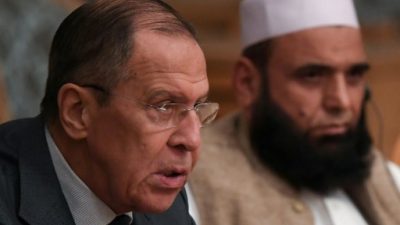The Russia -US -China -Taliban Talks in Moscow Are Bad News for India

Indian strategists are watching in horror as Russian, American, and Chinese interests increasingly converge in Afghanistan, with representatives from each of those three aforementioned Great Powers meeting in Moscow on Thursday to discuss the Taliban peace process in a major diplomatic development which proves that New Delhi has become just as irrelevant as the Kabul “government” when it comes to ending the conflict in the war-torn country.
All Roads Lead To Moscow
One of the worst-case scenarios that Indian strategists could have ever imagined is about to take place this Thursday April 25 in Moscow when representatives from Russia, America, and China meet to discuss the Taliban peace process. India has become just as irrelevant as the Kabul “government” when it comes to ending the conflict in the war-torn country due to its stubborn position against talking to the Taliban, a stance that resulted in its regional diplomatic isolation as the interests of the aforementioned three Great Powers increasingly converge. It’s highly significant that this forthcoming meeting is taking place in the Russian capital because it amounts to the US’ tacit recognition that Moscow has become the ultimate “balancing” force in this process after its recent mediation services resulted in the Taliban finally becoming seasoned diplomats. This development greatly assisted the ongoing peace talks and is responsible for the progress that’s been made thus far.
Pakistan Was Proven Right
Russia’s de-facto diplomatic “patronage” of the Taliban is part of its grander “Return to South Asia” that was facilitated to a large part by its game-changing strategic partnership with Pakistan, which only accelerated after India was exposed as the regional rogue state following its humiliation in the aftermath of February’s infamous Indo-Pak dogfight. India, through the prism of its zero-sum thinking, is therefore very nervous that the Russian-American-Chinese strategic convergence on Afghanistan will be detrimental to is own interests while advancing those of its Pakistani rival, which is a fait accompli in the event that these three Great Powers succeed in making additional progress on these talks since history has proven that Islamabad’s nearly two-decade-long consistent position advocating for a political solution to this long-running conflict is the only realistic one and has since been adopted by all the relevant players. Meanwhile, India’s dogmatic stance of a military solution has been discredited.
Desperate Times Call For Desperate Measures
In terms of political dynamics, it’s very disconcerting to India that its two American and Russian strategic partners are actively cooperating with one another on an issue where both of these New Cold War competitors are surprisingly in agreement for once in what turns out to be their opposition to New Delhi’s unconstructive stance towards the Afghan peace talks, to say nothing of including India’s Chinese rival into the mix as well while Pakistan’s diplomatic influence hangs heavy over the entire event. Given their predisposition to dramatically overreacting, it can’t be discounted that India won’t activate its levers of “deep state” influence in Russia to try to prevent any progress from being made, or at the very least spoil its optics by having its influential supporters downplay the significance of this event in the country’s domestic and international media. Even so, such desperate efforts are unlikely to result in any positive dividends for India.
Chabahar Corridor Concerns
Another one of India’s main concerns is that the convergence of Russian, American, and Chinese interests in Afghanistan might lead to the US’ two Great Power rivals attempting to strike a deal with Washington over lifting the waiver that was granted to New Delhi last year for the Chabahar Corridor pending any successful progress on their joint efforts regarding the Afghan peace process and specifically in getting the Taliban to reconsider talking with Kabul. The Trump Administration just announced that it won’t renew the oil sanctions waivers when they expire next month, which is expected to deal a heavy blow to Indian-Iranian relations, while the deathblow could easily be made if Washington lifts the Chabahar Corridor waiver in the event that it concludes that this project is insufficient for retaining its influence in Afghanistan by proxy and that it’s better to deal as much strategic damage to Iran as possible instead.
Concluding Thoughts
All told, Thursday’s meeting in Moscow between Russian, American, and Chinese representatives signifies the increasing convergence of these three Great Powers’ interests in Afghanistan at India’s expense given New Delhi’s intransigent attitude towards the Taliban peace talks. It’s extremely unlikely that India will reverse its position on this issue, not least because it can’t afford to be seen as agreeing to Pakistan’s long-standing stance, especially not during the ongoing month-long election process in the country. As such, India stands to strategically lose even more than ever before by isolating itself from this political process, which transforms its role in Afghanistan from that of an independent subject to a dependent object whose interests can be traded between the other Great Powers like what could happen if China convinces the US to lift its waiver on the Chabahar Corridor in exchange for it, Russia, and Pakistan successfully encouraging the Taliban to talk to Kabul.
*
Note to readers: please click the share buttons below. Forward this article to your email lists. Crosspost on your blog site, internet forums. etc.
This article was originally published on Eurasia Future.
Andrew Korybko is an American Moscow-based political analyst specializing in the relationship between the US strategy in Afro-Eurasia, China’s One Belt One Road global vision of New Silk Road connectivity, and Hybrid Warfare. He is a frequent contributor to Global Research.
Featured image is from France 24

